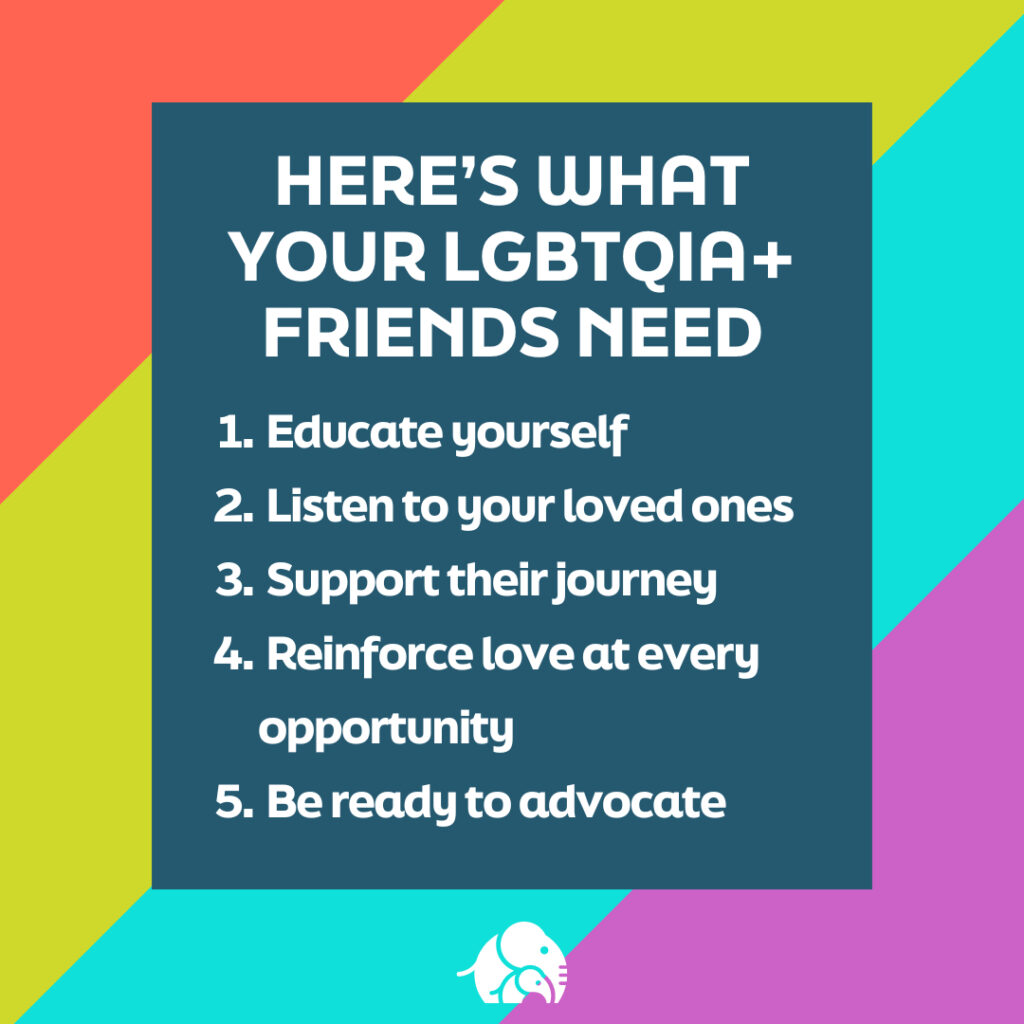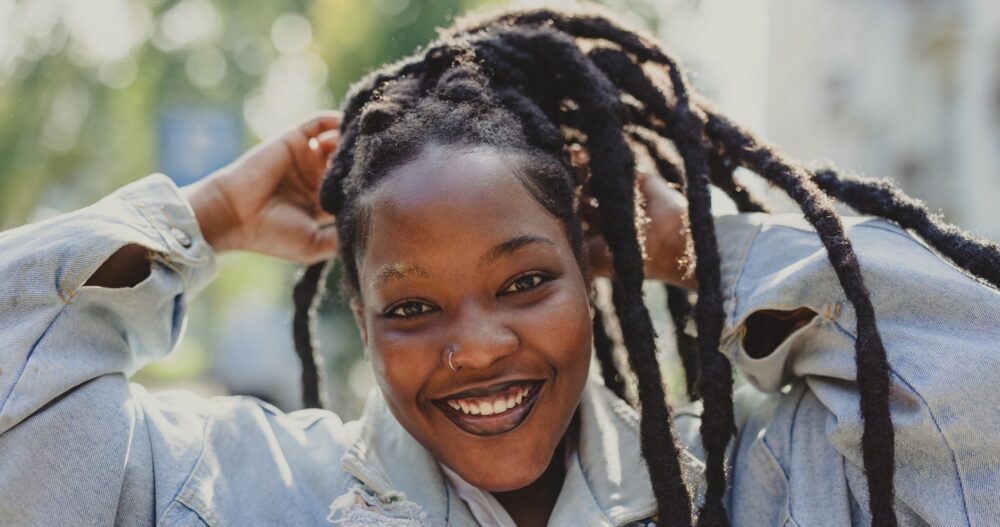Society has historically held the assumption that everyone is heterosexual and cisgender, so when someone isn’t and decides to share that with others, we say they are “coming out.” As a licensed social worker and member of the LGBTQIA+ community, I have seen good reactions and not-so-good reactions of caregivers and friends when their loved one comes out to them.
I get it, you might be shocked. But keep in mind that your first response is crucial. We have all had that moment where we step out in a new outfit and someone we know hesitates before they say they love it. Or maybe they say that they don’t approve of your taste.
Similarly, your loved one that is coming out will forever remember how you made them feel in that moment. It is important, of course, to feel your feelings, but in that moment your priority is to support this person.
If you are thinking of coming out to a loved one, check out this article with tips.
First Steps When a Loved One Comes Out to You
Start by creating a judgment free zone. To do this, it might help to put yourself in your loved one’s shoes: They might be feeling scared and vulnerable. While I’m glad that they felt safe enough to tell you their identity, they might not feel very supported or safe if their news was met with tears, confusion, and demanding questions. Additionally, creating a judgment free zone also calls for putting your own biases on the back-burner: you can recognize that this might take some getting used or that this might be hard for you at first, but feeding into these biases or negative feelings can create distance between you and your loved one.
The exception: happy tears. Happy tears are totally welcomed. If you know your loved one has been struggling with their identity for a while and finally felt free enough to tell you, you are allowed to cry with them and hug them (if they want). Some things that a loved one might enjoy to hear you say are:
- Thank you for feeling safe telling me this
- I love you then and now
- I am so proud of you
- Nothing will ever change the way I feel about you
You may have a lot of questions and that is completely understandable. I recommend asking them at a different time; you want this moment to be a memorable one in a positive way. Bottomline: the best way to support your LGBTQIA+ family member or friend is to be an ally.
What Does it Mean to be an Ally?
To be an ally of the LGBTQIA+ community means to be aware and educated of what is going on with the community. An ally is a crucial role. This allows to bring awareness and change to the problems affecting the LGBTQ+ community at large. Here are some tips for how to be a great ally to your loved ones:
- Become educated (learn terms, historical people, etc.)
- Be an active listener and create a judgement free zone (this also means respecting their boundaries when they need space)
- Be aware of current legislation (What is going on in your city or state?) and challenge LGBTQIA+ discrimination and prejudice. If you are not a member of the LGBTQIA+ community yourself, you can use your privilege to combat homophobia.

Safe Questions to Ask LGBTQIA+ Members
At stated previously, asking questions should be reserved to a time after the initial coming out. It was probably really hard for them to be honest and vulnerable. Give them a breather before you start asking all the questions. Allow them time for their fight or flight instinct to relax so that they can answer your questions in a more relaxed state.
That being said, it may be a little uncomfortable to ask questions after the fact. A great buffer would be: “Do you feel comfortable if I ask some questions related to your identity?” If they say no, respect their boundary and ask “When would be a good time for me to talk to you about these things?” If they respond yes, here is a list of questions that may be beneficial to ask (this also depends on the identity that they came out to you as):
- What are your preferred pronouns?
- What name would you like to go by?
- Would you like for me to refer to individuals you date as partner or boyfriend/girlfriend?
- How would you like for me to identify you through past memories?
- Is there anything I can do to make the rest of the family/friends aware?
- Is there anything additional I can do to make you feel safe?
- Is there something that I need to research to feel more educated?
This list is extremely small but a great starting point for conversation. The last bullet point is extremely important: your loved one may feel like it is not their job to educate you on their identity, so it is important to ask if there’s something specific that you need to research in order for them to feel seen and for you to understand them. Additionally, your loved one might not have all of the answers to these questions, and that’s also okay! Allow them time to figure things out, even if that may take a long while. Bottomline: let them know that no matter when they figure out the answer to these questions that you are ready to listen.
We are human and make mistakes… so what happens if I do?
During that initial coming out period is the most crucial to be supportive and understanding. However, it is also important that how you respond then is how you continue to respond. The questions listed above creates a foundation of what your loved one would prefer you to do going forward. It is totally human to forget or to make mistakes, but how you recover from those mistakes means the world.
If you call someone by their deadname (AKA the name that they previously went by) correct yourself immediately and try not to apologize. Again, it is human when a mistake is made to apologize, however keep in mind that if you apologize, you are prompting your loved one to say “It’s okay” when it’s really not. It’s best to correct yourself with the least amount of attention to make your loved one feel seen.
I often find that parents struggle the most with these changes because they are “mourning their child” or something along those lines. Keep in mind that your child isn’t going anywhere. They are still the amazing, beautiful human that they have always been—but perhaps with an added layer. Remember, this time is not about you. If you are struggling with the identity of your child, Ellie Mental Health offers a variety of resources and therapists available for you to help navigate these feelings, because they are valid, but your loved one does not deserve to comfort you at an extremely vulnerable time in their life.
The rule of thumb is treating your loved one the same way that you treated them before. Again, taking into consideration any changes that they requested. However, you do not need to shower them with rainbow gifts (unless that’s what they want of course). They just want to be treated the same way, but with their new identity.
In Summary…
This advice above is simple, yet often overlooked by so many caregivers and friends of the LGBTQ+ community. So many of us have to find our own families outside of our blood-related ones because of the lack of support of identities. We are still your child. We are still your friend. The lack of support also leads to increased rates of suicide for the LGBTQ+ community. Please do your research and educate yourself on how to assist your loved one. You are an important person in their life and your support could be life-saving.


